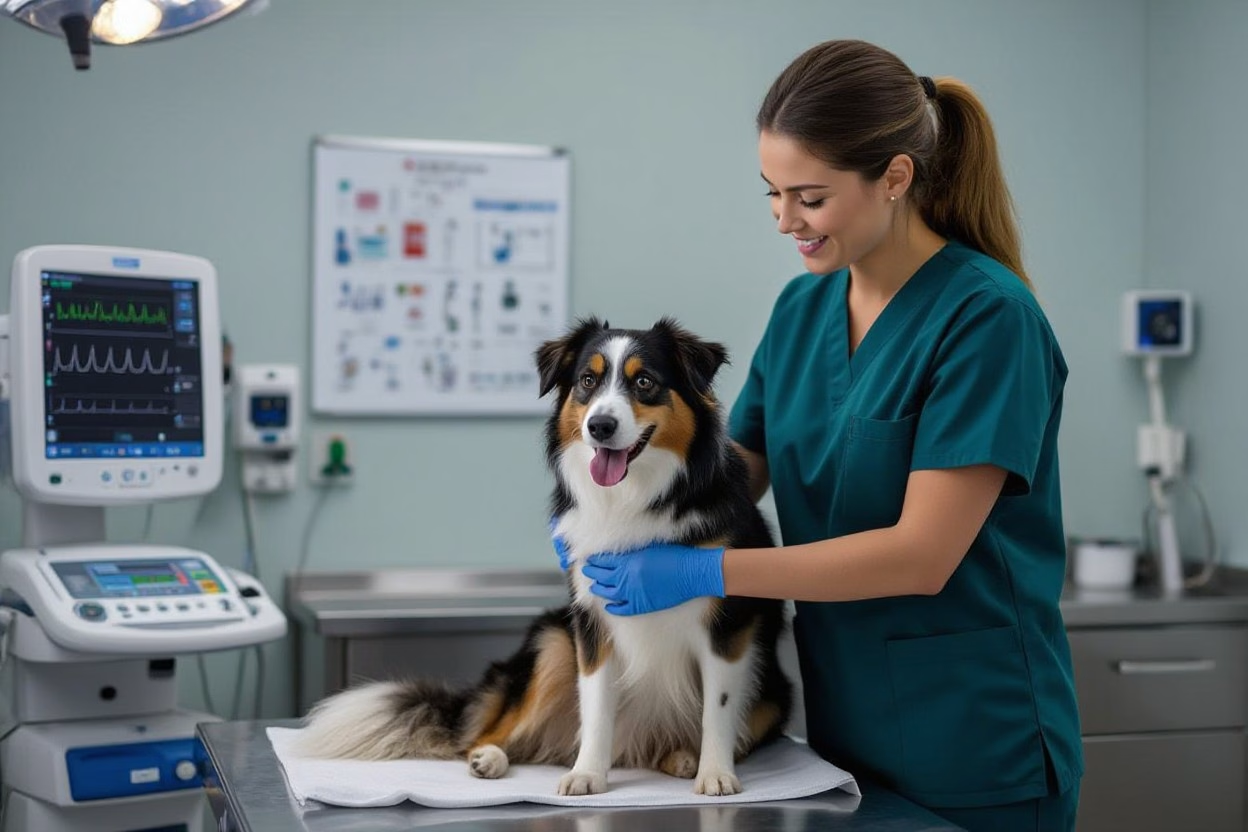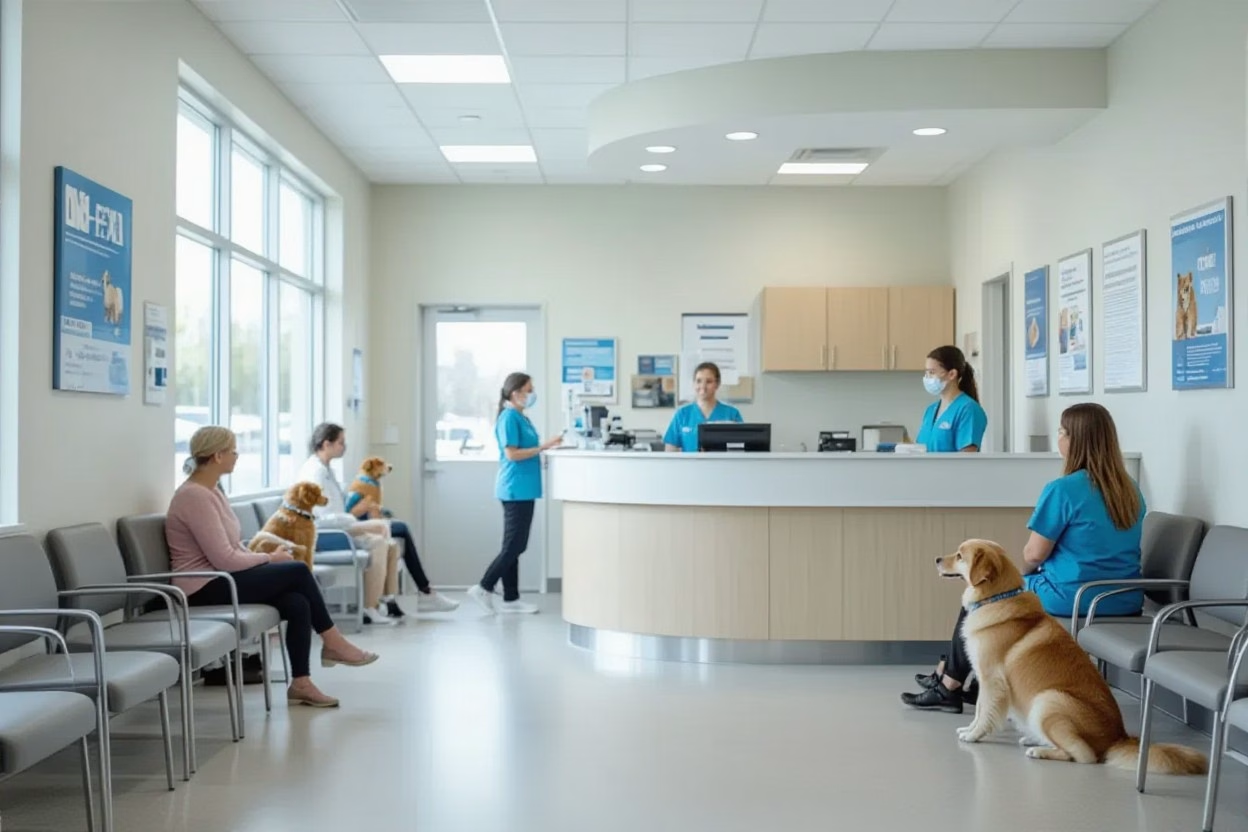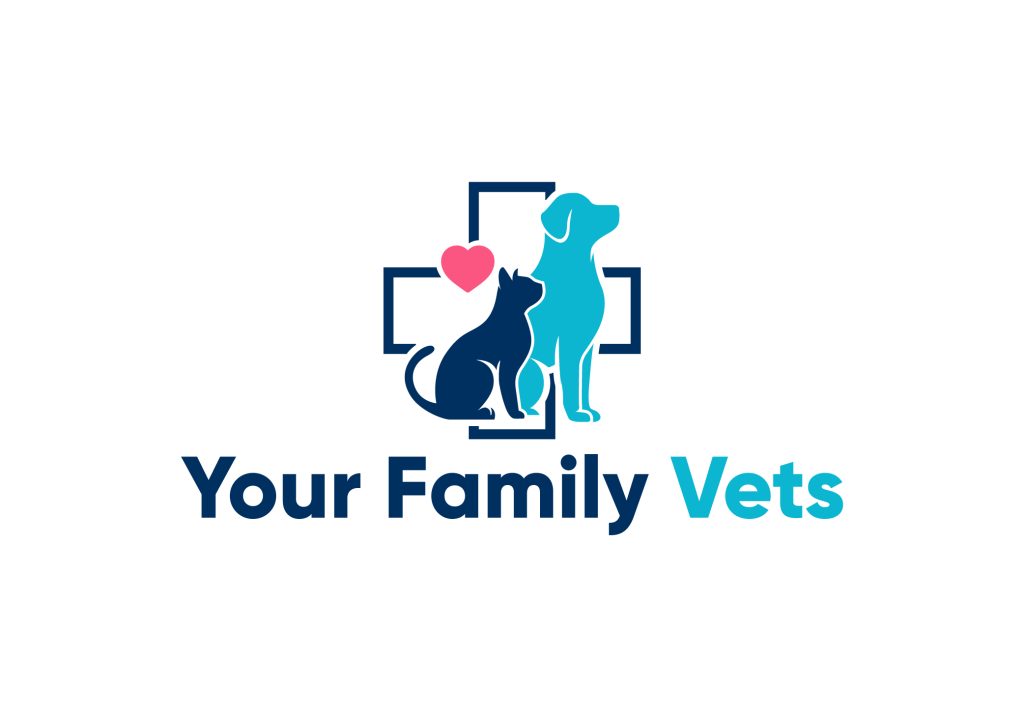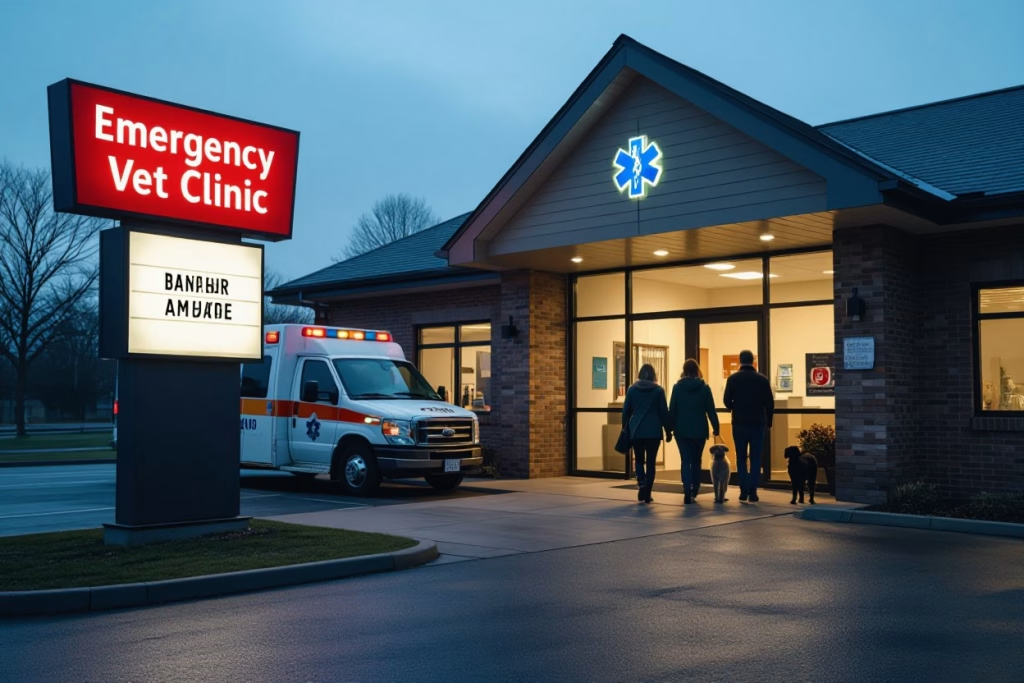It’s a frightening moment when your pet is suddenly ill or injured, and you need clear guidance; you should call us if your pet has difficulty breathing, collapse or seizures, severe bleeding, suspected poisoning or a bloated, painful abdomen. YorVet serves Harrogate and York with 24-hour support, rapid on-site diagnostics and emergency surgery when needed, so call immediately so we can triage your pet and advise the next steps to protect your companion.
Critical Moments: Identifying a Pet Emergency
Severe changes in behaviour or physiology can indicate life-threatening problems that need an emergency vet in Harrogate or Knaresborough fast. Spotting signs such as acute collapse, uncontrolled bleeding, laboured breathing or a swollen, tense abdomen lets you act before conditions worsen; call your local emergency vet Knaresborough or 24 hour vet Harrogate for immediate triage and transport advice. Act quickly when you see these red flags.
Recognizing Life-Threatening Conditions
Difficulty breathing or open-mouth breathing, seizures lasting more than 5 minutes, severe trauma (hit by a car), and bleeding that soaks a towel in 5–10 minutes all require urgent intervention. Abdominal distension with unproductive retching suggests bloat, while ingestion of xylitol, large doses of chocolate, or medications can cause rapid collapse—call an out of hours vet Knaresborough or emergency vet Harrogate immediately.
Common Behaviors Indicating Distress
Pacing, hiding, repeated vomiting (more than 3 times in an hour), persistent diarrhoea, collapse, or sudden reluctance to move often precede more serious issues. Laboured or very rapid breathing, pale or blue gums, and continuous crying out in pain are signs you should contact an urgent vet care Harrogate without delay. Trust your instincts if your pet’s behaviour is dramatically different.
Specific patterns help triage: drooling and pawing at the mouth may point to toxin ingestion, pacing plus a bloated, hard belly can indicate gastric dilatation-volvulus, and confusion or stumbling can signal low blood sugar or neurological events. If your pet shows these clusters of signs, keep them warm, limit movement, and phone YorVet or a vet open now Harrogate for immediate instructions and nearest emergency route. Fast transport can change outcomes.
Essential Signs: When Immediate Action is Vital
If you see seizures lasting over 5 minutes, severe breathing difficulty, collapse or unresponsiveness, profuse bleeding, a markedly swollen/distended abdomen (possible bloat), or persistent vomiting/diarrhoea with lethargy, call YorVet Harrogate immediately — these signs can deteriorate in minutes and need urgent assessment and possible surgery or hospitalisation.
Visual Cues to Watch For
If you notice gums that are pale, white, blue or bright red, a capillary refill time over 2 seconds, visible ribcage or laboured flanks, rapid breathing (>40 breaths/min at rest), drooling, dilated pupils, or a tense, distended abdomen, seek urgent care; heavy external bleeding, obvious fractures, or inability to bear weight require immediate transport to YorVet or a 24 hour vet Harrogate.
Behavioral Changes that Signal Trouble
If your pet shows sudden aggression, disorientation, repeated circling, inability to stand, continuous crying out, hiding for hours, or sudden loss of coordination, these often indicate pain, neurological events, or toxin exposure; cluster seizures or collapse need emergency care, so call YorVet Harrogate or an emergency vet Knaresborough without delay.
If your cat stops grooming, avoids the litter tray, or refuses food for 24–48 hours, it can rapidly progress to hepatic lipidosis or urinary obstruction; a male cat not passing urine for 12 hours is an emergency. If your dog vomits more than 6 times in 12 hours, shows persistent pacing or disorientation, you should seek same-day triage—early bloods, x‑ray or ultrasound at YorVet speeds diagnosis and treatment.

Comprehensive Care: What YorVet Provides
YorVet delivers a full spectrum of urgent and ongoing care so you can access the right treatment when your pet needs it most. You get 24/7 phone triage, same-day emergency consults at Harrogate, in-house monitoring and hospitalisation, plus coordinated referrals for specialist surgery — all geared to reduce delays that worsen outcomes for conditions like severe bleeding, respiratory distress or bloat.
Emergency Services and Consultations
You can call for immediate advice or come straight to our Harrogate clinic for an emergency consult; registered patients are often seen within 30 minutes. Triage determines whether you need on-site stabilisation (IV fluids, oxygen, pain relief), urgent imaging or same-day surgery, and our surgical team is available for high-risk trauma and post-op critical care.
Advanced Diagnostics and Treatment Options
On-site diagnostics include blood panels, digital x-rays and ultrasound so you get answers fast; in-house CBC results in about 60 minutes and digital radiography is available immediately for suspected fractures or foreign bodies. You’ll have targeted treatment plans—antidotes, surgery, or intensive nursing—based on clear diagnostic findings to speed recovery.
-
24/7 Phone Triage
What you receive Immediate guidance, prioritisation for life-threatening signs, directions to Harrogate or nearest out‑of‑hours facility -
Same-day Emergency Consults
What you receive Clinical examination, stabilisation (IV fluids, oxygen), pain management and a clear next‑step plan -
On-site Stabilisation
What you receive Continuous monitoring, IV therapy, temperature control and wound/bleed management to buy time for diagnostics -
On-call Surgical Team
What you receive Emergency surgery for trauma, foreign body removal or life‑saving abdominal procedures with post‑op critical care -
Out‑of‑hours Coordination
What you receive Clear instructions if transfer is needed, estimated travel times from Knaresborough to Harrogate and continuity of records
Further detail on diagnostics: you benefit from in-house blood chemistry (results 2–3 hours), point-of-care lactate and glucose checks (minutes), and urgent cytology to guide antibiotic or antifungal choices. Digital x-rays give immediate skeletal and thoracic assessment; ultrasound performed same day detects abdominal free fluid, intussusception or foreign bodies to decide whether laparotomy is required.
-
Blood Testing
Use CBC for anaemia/infection (~60 min), biochemistry for organ function (2–3 hr), electrolytes guide IV fluid choice -
Digital Radiography
Use Immediate assessment for fractures, thoracic trauma and ingested radiopaque objects; images shared with you and referral surgeons -
Abdominal Ultrasound
Use Detects free fluid, obstructions, pancreatitis signs and helps plan surgery without delay -
Endoscopy & Specialist Referral
Use Non‑surgical foreign body removal when suitable; rapid referral arranged for CT or specialist surgeons if needed

Step-by-Step: Navigating a Pet Emergency
Assess airway, breathing and circulation first, then secure your pet and call YorVet so a triage nurse can advise. Control visible heavy bleeding, keep your pet warm and still, and prepare for immediate transport to the Harrogate clinic (within easy reach from Knaresborough). Have details ready: what happened, time of onset, any toxins ingested and current medications.
| Step | What to do |
|---|---|
| 1. Rapid assessment | Check airway, breathing and pulse; look at gum colour—pale or blue gums signal emergency. Call YorVet immediately if unresponsive or breathing is abnormal. |
| 2. Stop bleeding | Apply firm pressure with a clean cloth for 5–10 minutes. Use a tourniquet only if bleeding is life‑threatening and you can’t control it otherwise. |
| 3. Stabilise | Immobilise suspected fractures with a towel or makeshift splint; muzzle if the animal may bite. Keep movement to a minimum during transfer. |
| 4. Prevent shock | Keep your pet warm with a blanket, elevate hindquarters if breathing is shallow, and avoid giving food, drink or medication unless instructed by the vet. |
| 5. Transport safely | Use a crate or blanket as a stretcher, secure in the car, and call ahead so the Harrogate team can prepare diagnostics and a treatment space. |
| 6. On arrival | Bring any packaging, a sample of vomit or foreign object in a sealed bag, a list of medications, vaccination info and your contact/insurance details. |
Immediate Actions to Take
Check breathing for up to 10 seconds and listen for abnormal sounds; if breathing has stopped, get on the phone with YorVet so staff can talk you through emergency CPR. For seizures, note start time and call if the episode lasts more than 2 minutes or if seizures recur. Apply pressure to major wounds, avoid moving the spine if trauma is suspected, and muzzle only if the pet is likely to bite despite pain.
Preparing for Your Vet Visit
Gather a leash/crate, a towel or blanket, recent medication list with dosages, vaccination records, and any packaging from poisons or plants. Bring a sample of vomit, stool or the foreign object in a sealed bag, plus photo ID and payment method. Tell the receptionist if you’re calling from Knaresborough so staff can estimate arrival time and pre-stage in‑house diagnostics.
If you suspect poisoning, note the exact substance, quantity and time ingested—dark chocolate, for example, becomes dangerous at lower doses in small dogs; record your pet’s weight to help vets calculate antidote doses. For trauma, give the mechanism (hit by car, fall height) and timings; that helps the team decide whether to prioritise x‑rays, bloods or ultrasound on arrival and speeds up critical treatment.
The Importance of Timely Intervention: Local Support in Harrogate and York
Swift local action changes outcomes: when you spot severe bleeding, breathing difficulty or sudden collapse, contacting YorVet in Harrogate or our York partners gets your pet into hands that can provide immediate triage, pain relief and same-visit diagnostics like blood tests, x-rays and ultrasound. You’ll benefit from clinicians familiar with local emergency pathways and transport times, so decisions about surgery or hospitalisation are made faster and with clearer information for you and your pet.
Out-of-Hours Services: What to Expect
Calling outside clinic hours connects you to an experienced triage team who assess severity, give step-by-step first-aid guidance and advise whether you should travel to the Harrogate clinic, York emergency centre or monitor at home. On arrival expect rapid stabilisation, analgesia and targeted diagnostics; for life‑threatening signs such as unresponsiveness or severe respiratory distress you’ll be prioritised for immediate treatment and escalation to on‑call surgeons if needed.
Building a Trusting Relationship with YorVet
You’ll notice continuity of care from the first emergency call: staff access your pet’s records, explain likely costs and next steps, then follow up after discharge. Registered clients are prioritised during busy periods and our team documents treatments and recovery plans so your regular vet can continue care seamlessly, giving you confidence that urgent decisions are supported by complete clinical information.
To make that relationship work for you, register your pet with YorVet before an emergency and keep vaccination and medication lists updated; having recent notes and photos of symptoms can cut triage time. Our practice logs prior anaesthetic histories, chronic conditions and drug sensitivities so when you arrive we avoid delays—this practical preparation often reduces treatment time and improves outcomes for dogs and cats across Harrogate, York and nearby Knaresborough.
To wrap up
The emergency vet in Harrogate & York is here so you can access rapid, expert care when your pet shows serious signs; if your dog or cat is breathing poorly, collapsing, bleeding heavily, or has swallowed something dangerous, call us right away and you’ll get clear triage, prompt diagnostics and experienced treatment to give your pet the best chance of recovery.
FAQ
Q: When should I call an emergency vet?
A: Call an emergency vet immediately for difficulty breathing, seizures or collapse, being hit by a car or any severe trauma, ingesting poison or foreign objects, heavy or uncontrolled bleeding, a swollen or hard abdomen (possible bloat), repeated vomiting or diarrhoea, not urinating or defecating, or prolonged labour/straining to give birth. If you’re in Knaresborough, Harrogate or York and unsure, call our team — we’ll advise whether you need urgent vet care Harrogate or an immediate consult.
Q: What signs indicate my pet needs immediate help?
A: Pale, blue or very bright red gums; sudden weakness, disorientation or collapse; unresponsiveness or loss of consciousness; severe, rapid or struggling breathing; tremors, repeated fits or collapse; intense vocalisation or signs of severe pain; continuous vomiting or diarrhoea causing dehydration. If you see any of these, treat it as a potential emergency and contact YorVet or a dog emergency vet Knaresborough / cat emergency vet near me right away.
Q: What should I do right now if my pet is injured or unwell?
A: Stay calm and keep people and other animals away; move your pet only if safe, supporting neck and spine if trauma is suspected; call YorVet immediately for triage and instruction; do not give human medications unless directed by a vet; use a crate, blanket or board to transport safely; bring a list of medications, recent illnesses, what was ingested (if applicable) and any vaccination history. For immediate local advice, call YorVet Harrogate on [Phone Number].
Q: How does out-of-hours emergency care work for Harrogate, Knaresborough and York?
A: YorVet offers out-of-hours triage by our on-call team to assess urgency and advise next steps. During clinic hours we provide in-clinic emergency consults and diagnostics; outside hours calls are handled by our on-call clinicians or a partnered emergency service to ensure 24 hour vet Harrogate support. If an in-person assessment is needed, we will direct you to the closest emergency consult location (Harrogate clinic serves Knaresborough residents) or arrange transfer to an appropriate facility for intensive care.
Q: What emergency services does YorVet provide and do you treat non-registered pets?
A: YorVet provides emergency consultations during clinic hours, out-of-hours triage and advice, in-house diagnostics (blood tests, x‑rays, ultrasound), stabilisation and critical care, on-call surgical support and hospitalisation when required. Registered clients are prioritised in emergencies, but we will treat non-registered pets — registering ahead of time helps us access records and act faster. For urgent vet care Harrogate or vet open now Harrogate enquiries, contact YorVet immediately on [Phone Number].

